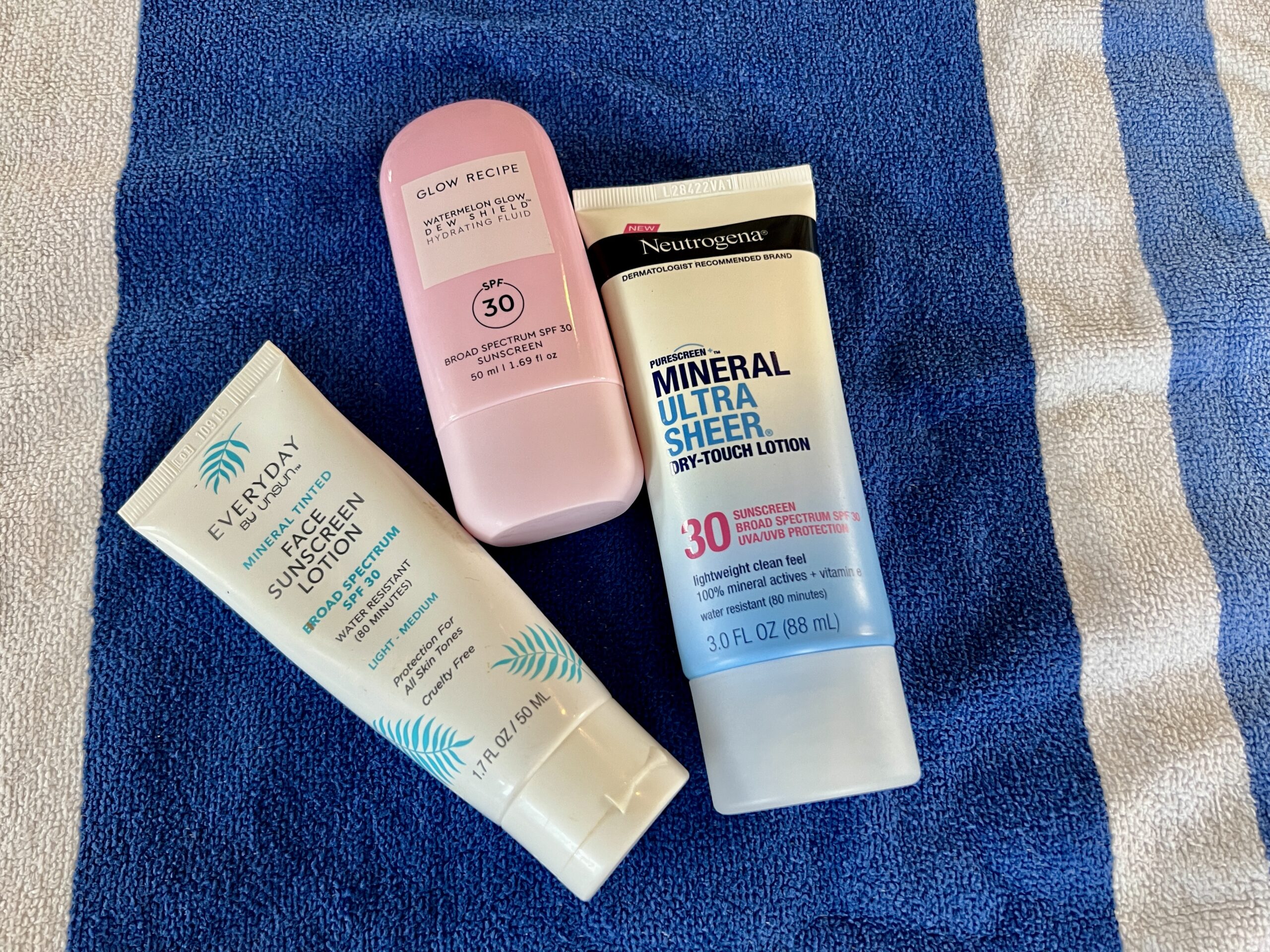South Sudan Comes to Sedgwick Middle School

Audio By Carbonatix
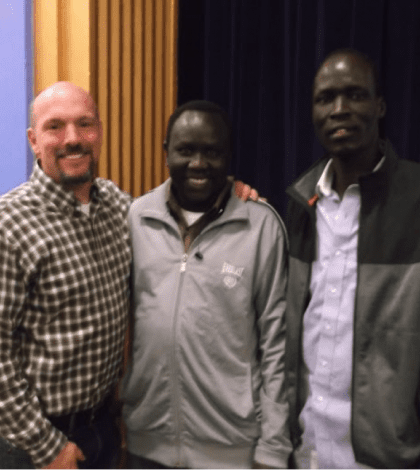
From left: Sedgwick social studies teacher Stephen Kay with former 'Lost Boys' Abraham Deng and Dut Tong. Submitted photo
A visit by two ‘Lost Boys’ from South Sudan to West Hartford’s Sedgwick Middle School prompted students to take action to make a difference for the lives of people halfway across the world through participating in The Iron Giraffe Challenge.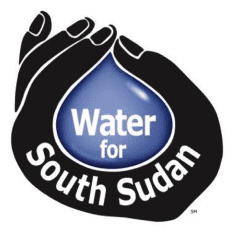
Written and submitted by Sedgwick Middle School sixth grade students: Maddy Duskocy, Nona Ferney, Natalie Giese, Taaliah Ogountola, Katie Powers, Laila Temraoui, and Tia Trang
How can a country come to a middle school? It all started when the students at Sedgwick Middle School learned about the differences between the developing countries and the developed countries in social studies class.
Once they had knowledge about demographic statistics around the world they were able to examine images and videos of what those statistics “look like” in the real world. Then, the real world became more personal when they started reading A Long Walk To Water, an inspiring novel that tells the story what life can be like in one developing country, South Sudan.
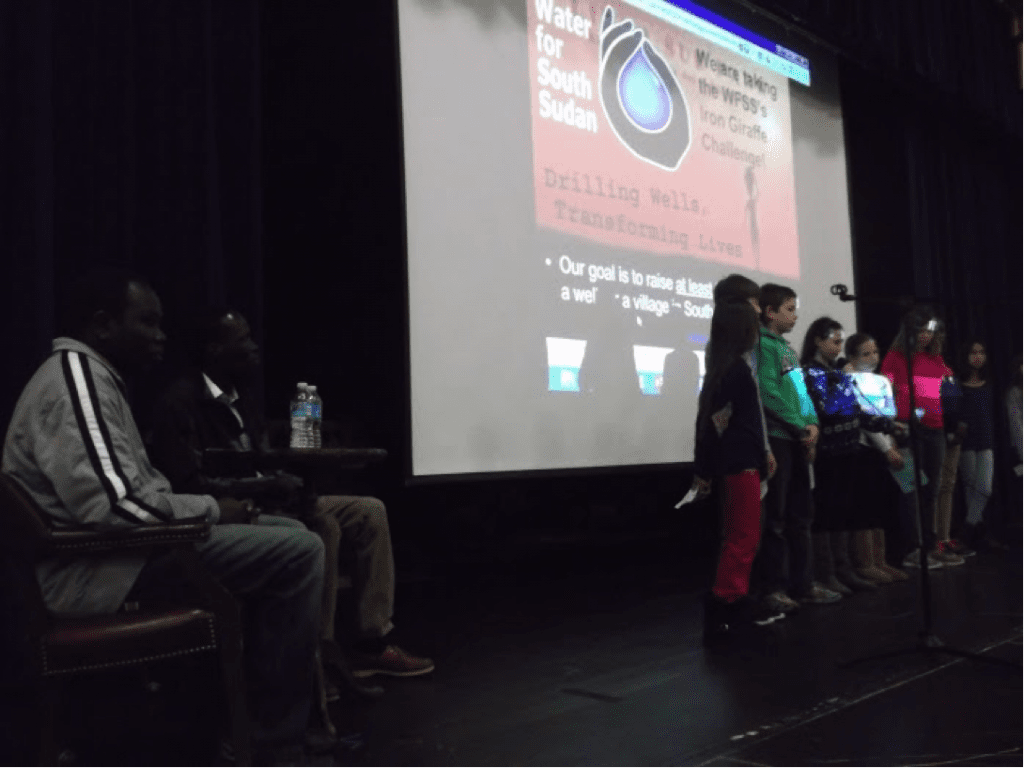
Sedgwick students share their appreciation for guests speakers Abraham Deng and Dut Tong. Submitted photo
This experience prepared students for a visit from two former Lost Boys, who talked about their lives living in South Sudan, being refugees and migrating to America. The lessons learned have changed the lives of the students, so much so that they want to now change the lives of others and have started collecting funds that will pay for wells to be dug in South Sudan.
When 6th grade students first came to Mr. Kay’s social studies class they were introduced to the saying, “Where you live affects how you live.” Today they can talk about demographic statistics like access to water, sanitation, fertility rate, life expectancy, and income per capita as they describe life in different regions of the world.
They can also discuss the impact of geography and effects of government or war on people.
Finally, they are able to analyze how cultural differences influence the lives of people depending on where they live.
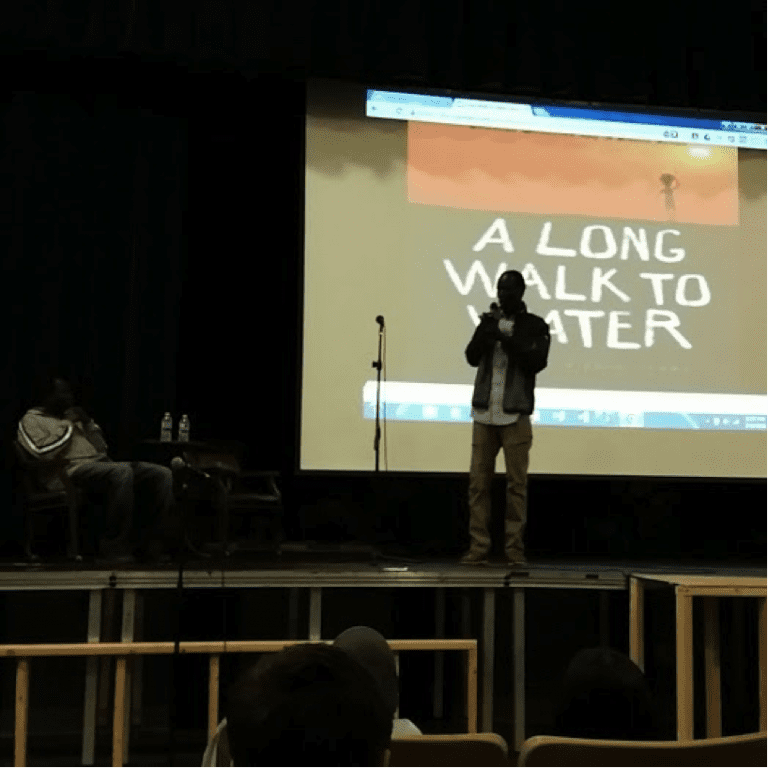
Dut Tong speaks to the Sedgwick students. At left is Abraham Deng. Submitted photo
How is it possible that 11- and 12-year-old kids are able to understand such complex topics? By studying vocabulary, using it in debates, making claims about the world and backing it up with evidence, taking part in simulations, and analyzing video clips or images, students sound like little adults as they tackle mature issues that usually grown ups deal with. They truly better understand that “where you live affects how you live.”
The real world is a hard place and sometimes you need to lose yourself in a book to get away from it, but in Long Walk to Water, the reader gets lost in a world where sadly everything is real. Once students had enough background information about the world, they were ready to read this short but powerful book.
A Long Walk to Water has two different characters. The first is an 11-year-old boy named Salva who lives in the year of 1985. He becomes a Lost Boy and goes on an unforgetable journey after escaping from war in South Sudan. He comes across challenges that made children leave the room with their mouths agape.
The second character, Nya, is a young girl who walks hours and hours a day to get water in the same country, where she is unable to get an education.
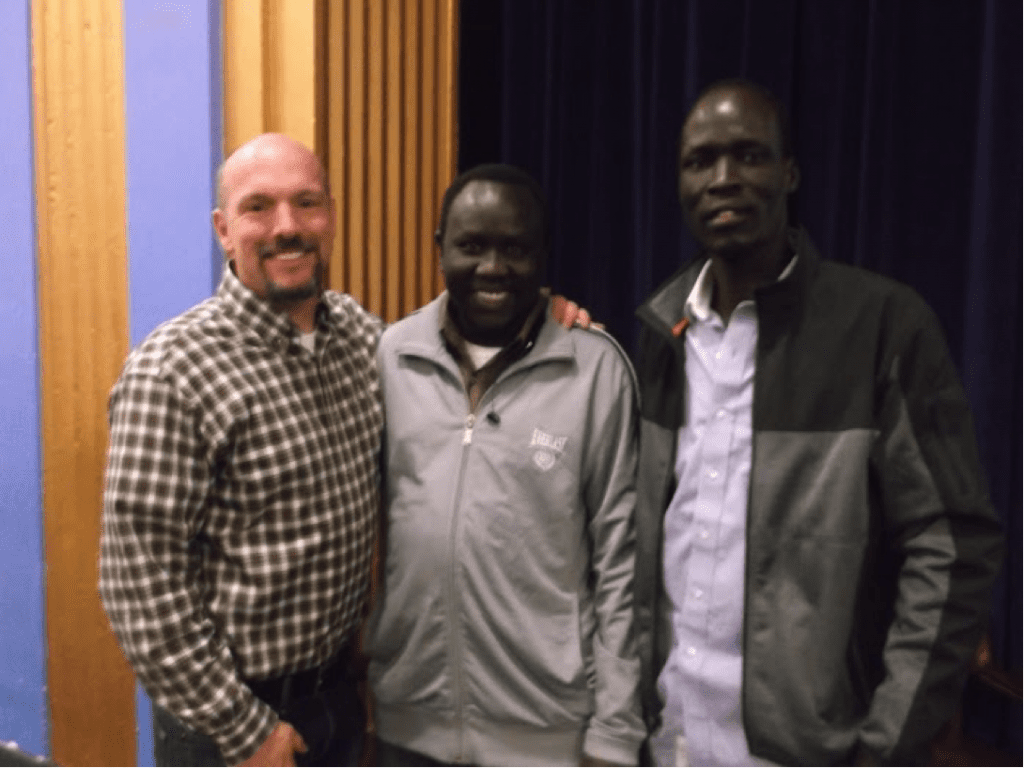
From left: Sedgwick social studies teacher Stephen Kay with former ‘Lost Boys’ Abraham Deng and Dut Tong. Submitted photo
Learning about the real life stories of two children living in what seemed like a completely different world made students want to throw their book across the room in disbelief. Some students even wept. This book is incredible and left students on the edge of their seats.
The sixth grade children at Sedgwick Middle School’s reaction was monumental, marvelous and one they will never forget! In fact, it left students wanting to learn more, so when they heard that two real life former Lost Boys would be visiting their school, they were overjoyed.
On Feb. 19, 2016, two speakers that were former Lost Boys from Sudan came to Sedgwick Middle School. Abraham Deng actually walked with Salva on part of his journey, while the other speaker, Dut Tong, is the father of a seventh grader here at Sedgwick!
The two speakers talked about South Sudan and what life was like. South Sudan is very different in ways the students did not think possible. For instance, in the village of one of the speakers is from they don’t even have a well that gives them clean water.
During the assembly, students were able to ask questions about topic ranging from what South Sudanese life is like, the challenges of being a refugee, to the challenges of settling in America. The informative and powerful answers opened students eyes inspiring them to take on the Iron Giraffe Challenge.
What is the Iron Giraffe challenge? The Iron Giraffe challenge is a contest to help raise money to build wells in South Sudan. Salva Dut, the main character in A Long Walk to Water grew up to become the founder of “Water For South Sudan,” an organization that drills wells in South Sudan.
Drilling a well costs $15,000, but today drills are breaking down. In a way this is a good thing because it means that they have used the drills so much, but it is also a bad thing because it means they may have trouble drilling wells in the future. So they need help raising money so they can buy new drills.
Dut has challenged schools around the country to raise money to build wells so that the people in South Sudan can get clean water. This can help South Sudan because we are helping to provide clean water to the people who live there. When wells are built, markets, clinics, and finally schools are set up nearby. Sedgwick Middle School is trying to make a difference and change people’s lives.
To help raise the money to be donated to The Iron Giraffe Challenge for South Sudan, students at Sedgwick are planning several fundraisers to help. They are hoping to have a sixth grade party, a bake sale, and a car wash during the springtime. They will also be sending out forms to buy t-shirts. With all these fundraisers, South Sudan will have better access to water in no time!
If you would like to support the cause go to https://donatenow.networkforgood.org/waterforsouthsudan. You will see a box under “Donations for school and organization fundraisers” where you can type in “on behalf of Sedgwick Middle School.”
Sedgwick is making these donations in honor of the guest speakers: Dut Tong and Abraham Deng.
If you would like to order a t-shirt email [email protected]. Together, the goal is to raise at least $5,000.
The question of ¨How can a country come to a middle school?” makes sense now. With a lot of background knowledge about the real world combined with an AMAZING book called A Long Walk to Water, Sedgwick students were ready to hear two former Lost Boys tell their eye-opening stories. Students now look at the world differently than they did just six months ago and want to make a difference. With the help of The Iron Giraffe challenge this is exactly what they plan to do … one drop at a time.
Like what you see here? Click here to subscribe to We-Ha’s newsletter so you’ll always be in the know about what’s happening in West Hartford!



